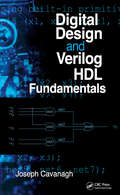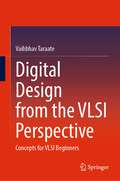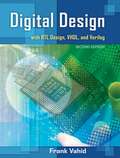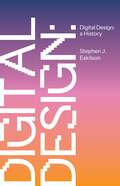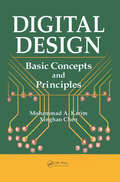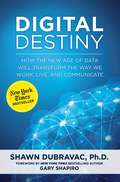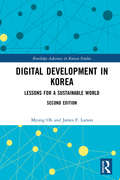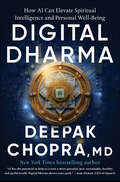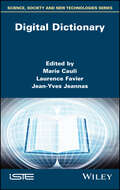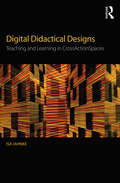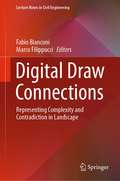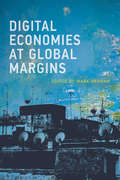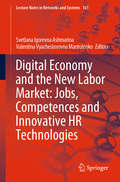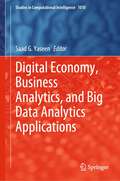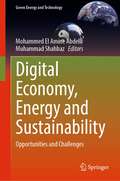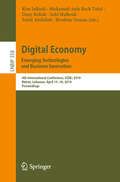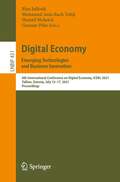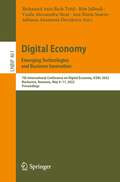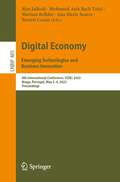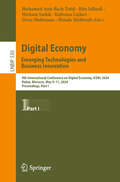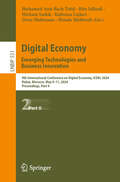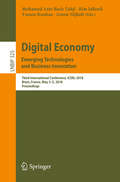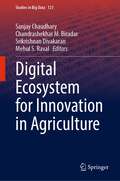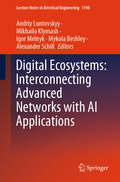- Table View
- List View
Digital Design and Verilog HDL Fundamentals
by Joseph CavanaghComprehensive and self contained, this tutorial covers the design of a plethora of combinational and sequential logic circuits using conventional logic design and Verilog HDL. Number systems and number representations are presented along with various binary codes. Several advanced topics are covered, including functional decomposition and iterative networks. A variety of examples are provided for combinational and sequential logic, computer arithmetic, and advanced topics such as Hamming code error correction. Constructs supported by Verilog are described in detail. All designs are continued to completion. Each chapter includes numerous design issues of varying complexity to be resolved by the reader.
Digital Design from the VLSI Perspective: Concepts for VLSI Beginners
by Vaibbhav TaraateThis volume covers digital design techniques, exercises and applications. The book discusses digital design and implementation in the context of VLSI and embedded system design. It covers basic digital design techniques to high speed design techniques. The contents also cover performance improvement, optimization concepts and design case studies. It includes pedagogical features such as design examples and illustrations. This book will be a useful guide for hardware engineers, logic design engineers, professionals and hobbyists looking to learn and use the digital design to develop VLSI based algorithms, architectures and products.
Digital Design using VHDL: A Systems Approach
by William J. Dally R. Curtis Harting Tor M. AamodtThis introductory textbook provides students with a system-level perspective and the tools they need to understand, analyze and design digital systems. Going beyond the design of simple combinational and sequential modules, it shows how such modules are used to build complete systems, reflecting real-world digital design. All the essential topics are covered, including design and analysis of combinational and sequential modules, as well as system timing and synchronization. It also teaches how to write VHDL-2008 HDL in a productive and maintainable style that enables CAD tools to do much of the tedious work. A complete introduction to digital design is given through clear explanations, extensive examples and online VHDL files. The teaching package is completed with lecture slides, labs and a solutions manual for instructors. Assuming no previous digital knowledge, this textbook is ideal for undergraduate digital design courses that will prepare students for modern digital practice.
Digital Design with RTL Design, VHDL, and Verilog
by Frank VahidIn eagerly anticipated, up-to-date guide to essential digital design fundamentals <P><P>Offering a modern, updated approach to digital design, this much-needed book reviews basic design fundamentals before diving into specific details of design optimization. You begin with an examination of the low-levels of design, noting a clear distinction between design and gate-level minimization. The author then progresses to the key uses of digital design today, and how it issued to build high-performance alternatives to software. <P><P>Offers a fresh, up-to-date approach to digital design, whereas most literature available is sorely outdated Progresses though low levels of design, making a clear distinction between design and gate-level minimization <P><P>Addresses the various uses of digital design today Enables you to gain a clearer understanding of applying digital design to your life <P><P>With this book by your side, you'll gain a better understanding of how to apply the material in the book to real-world scenarios. <P><P>Offers a fresh, up-to-date approach to digital design, whereas most literature available is sorely outdated <P><P>Progresses though low levels of design, making a clear distinction between design and gate-level minimization <P><P>Addresses the various uses of digital design today Enables you to gain a clearer understanding of applying digital design to your life <P><P>With this book by your side, you'll gain a better understanding of how to apply the material in the book to real-world scenarios.
Digital Design: A History
by Stephen EskilsonA groundbreaking history of digital design from the nineteenth century to todayDigital design has emerged as perhaps the most dynamic force in society, occupying a fluid, experimental space where product design intersects with art, film, business, engineering, theater, music, and artificial intelligence. Stephen Eskilson traces the history of digital design from its precursors in the nineteenth century to its technological and cultural ascendency today, providing a multifaceted account of a digital revolution that touches all aspects of our lives.We live in a time when silicon processors, miniaturization, and CAD-enhanced 3D design have transformed the tangible world of cars and coffee makers as well as the screen world on our phones, computers, and game systems. Eskilson provides invaluable historical perspective to help readers better understand how digital design has become such a vibrant feature of the contemporary landscape. He covers topics ranging from graphic and product design to type, web design, architecture, data visualization, and virtual reality. Along the way, he paints compelling portraits of key innovators behind this transformation, from foundational figures such as Marshall McLuhan, Nam June Paik, and April Greiman to those mapping new frontiers, such as Jeanne Gang, Jony Ive, Yugo Nakamura, Neri Oxman, and Jewel Burks Solomon.Bringing together an unprecedented array of sources on digital design, this comprehensive and richly illustrated book reveals how many of the digital practices we think of as cutting-edge actually originated in the analog age and how the history of digital design is as much about our changing relationship to forms as the forms themselves.
Digital Design: Basic Concepts and Principles
by Mohammad A. Karim Xinghao Chen<p>In today’s digital design environment, engineers must achieve quick turn-around time with ready accesses to circuit synthesis and simulation applications. This type of productivity relies on the principles and practices of computer aided design (CAD). Digital Design: Basic Concepts and Principles addresses the many challenging issues critical to today’s digital design practices such as hazards and logic minimization, finite-state-machine synthesis, cycles and races, and testability theories while providing hands-on experience using one of the industry’s most popular design application, Xilinx Web PACK. <p>The authors begin by discussing conventional and unconventional number systems, binary coding theories, and arithmetic as well as logic functions and Boolean algebra. Building upon classic theories of digital systems, the book illustrates the importance of logic minimization using the Karnaugh map technique. It continues by discussing implementation options and examining the pros and cons of each method in addition to an assessment of tradeoffs that often accompany design practices. The book also covers testability, emphasizing that a good digital design must be easy to verify and test with the lowest cost possible. <p>Throughout the text, the authors analyze combinational and sequential logic elements and illustrate the designs of these components in structural, hierarchical, and behavior VHDL descriptions. Coveringfundamentals and best practices, Digital Design: Basic Concepts and Principles provides you with critical knowledge of how each digital component ties together to form a system and develops the skills you need to design and simulate these digital components using modern CAD software.</p>
Digital Destiny: How the New Age of Data Will Transform the Way We Work, Live, and Communicate
by Gary Shapiro Shawn DubravacOur world is about to change.<P> In Digital Destiny: How the New Age of Data Will Change the Way We Live, Work, and Communicate, Shawn DuBravac, chief economist and senior director of research at the Consumer Electronics Association (CEA), argues that the groundswell of digital ownership unfolding in our lives signals the beginning of a new era for humanity. Beyond just hardware acquisition, the next decade will be defined by an all-digital lifestyle and the “Internet of Everything”—where everything, from the dishwasher to the wristwatch, is not only online, but acquiring, analyzing, and utilizing the data that surrounds us. But what does this mean in practice?<P> It means that some of mankind’s most pressing problems, such as hunger, disease, and security, will finally have a solution. It means that the rise of driverless cars could save thousands of American lives each year, and perhaps hundreds of thousands more around the planet. It means a departure from millennia-old practices, such as the need for urban centers. It means that massive inefficiencies, such as the supply chains in Africa allowing food to rot before it can be fed to the hungry, can be overcome. It means that individuals will have more freedom in action, work, health, and pursuits than ever before.
Digital Development in Korea: Lessons for a Sustainable World (Routledge Advances in Korean Studies)
by Myung Oh James F. LarsonDigital Development in Korea explores the central role of digital information and communication technology in South Korea. Analysing the role of ICT in green growth and sustainability, this new edition also demonstrates how concerns over public safety and the Olympic Games, are shaping next generation digital networks. Presenting a network-centric perspective to contextualize digital development politically, economically and socially, and in relation to globalization, urbanization and sustainability, this book builds on firsthand experience to explain the formulation and implementation of key policy decisions. It describes the revolutionary changes of the 1980s, including privatization and color television and the thorough restructuring that created a telecommunications sector. It then goes on to explore the roles of government leadership, international development and education in affecting the diffusion of broadband mobile communication, before weighing up the positive and negative aspects of Korea’s vibrant new digital media. Seeking to identify aspects of the Korean experience from which developing countries around the world could benefit, this book will be of interest to students, scholars and policymakers interested in communications technologies, Korean Studies and Developmental Studies.
Digital Dharma: How AI Can Elevate Spiritual Intelligence and Personal Well-Being
by Deepak ChopraNew York Times bestselling author Deepak Chopra delivers a visionary and unprecedented exploration of how artificial intelligence can revolutionize well-being and open new horizons for personal development.&“AI has the potential to help us create a more peaceful, just, sustainable, healthy, and joyful world. Digital Dharma shows you a path.&”—Sam Altman, CEO of OpenAIIn a world captivated yet bewildered by artificial intelligence, spiritual icon Deepak Chopra, MD, illuminates AI&’s untapped potential to unravel the enigma of consciousness, positioning AI not as a threat but as a catalyst for personal and collective growth. In Digital Dharma, Chopra navigates the balance between technology and expanded awareness, explaining that while AI cannot duplicate human intelligence, it can vastly enhance personal and spiritual growth.Chopra shows readers how the most popular, freely available chatbots can serve as guides through every level of human potential—survival and safety, emotional connection, self-worth, abundance, creativity, wisdom, and the infinite possibilities of cosmic consciousness. AI chatbots offer information, advice, and exploratory avenues of untapped potential about any aspect of human awareness. In practical terms, making AI your ally and guide depends on the art of the prompt, the questions a user poses to a chatbot. As Chopra shows in detail, by asking the right questions, you can bring AI into your inner world, which is where personal growth happens. Chopra provides a personal assessment for you to better understand yourself and exercises to help you expand your awareness in any part of your life.Digital Dharma masterfully helps readers to harness AI, not merely as a technological tool but as a partner in crafting a future where human potential solves the urgent problems facing the planet and each of us as individuals. Deepak Chopra invites us to transcend our limitations and explore a relationship with AI that elevates collective consciousness and personal evolution at the same time.
Digital Dictionary
by Marie Cauli Laurence Favier Jean-Yves Jeannas"Digital age", "digital society", &“digital civilization&”: many expressions are used to describe the major cultural transformation of our contemporary societies.Digital Dictionary presents the multiple facets of this phenomenon, which was born of computers and continues to permeate all human activity as it progresses at a rapid pace. In this multidisciplinary work, experts, academics and practitioners invite us to discover the digital world from various technological and societal perspectives.In this book, citizens, trainers, political leaders or association members, students and users will find a base of knowledge that will allow them to update their understanding and become stakeholders in current societal changes.
Digital Didactical Designs: Teaching and Learning in CrossActionSpaces
by Isa JahnkeAs web-enabled mobile technologies become increasingly integrated into formal learning environments, the fields of education and ICT (information and communication technology) are merging to create a new kind of classroom: CrossActionSpaces. Grounding its exploration of these co-located communication spaces in global empirical research, Digital Didactical Designs facilitates the development of teachers into collaborative designers and evaluators of technology-driven teaching and learning experiences—learning through reflective making. The Digital Didactical Design model promotes deep learning expeditions with a framework that encourages teachers and researchers to study, explore, and analyze the applied designs-in-practice. The book presents critical views of contemporary education, theories of socio-technical systems and behavior patterns, and concludes with a look into the conceptual and practical prototypes that might emerge in schools and universities in the near future.
Digital Draw Connections: Representing Complexity and Contradiction in Landscape (Lecture Notes in Civil Engineering #107)
by Fabio Bianconi Marco FilippucciThis book stems from the seminal work of Robert Venturi and aims at re-projecting it in the current cultural debate by extending it to the scale of landscape and placing it in connection with representative issues. It brings out the transdisciplinary synthesis of a necessarily interdisciplinary approach to the theme, aimed at creating new models which are able to represent the complexity of a contradictory reality and to redefine the centrality of human dimension. As such, the volume gathers multiple experiences developed in different geographical areas, which come into connection with the role of representation. Composed of 43 chapters written by 81 authors from around the world, with an introduction by Jim Venturi and Cezar Nicolescu, the volume is divided into two parts, the first one more theoretical and the other one which showcases real-world applications, although there is never a total split between criticism and operational experimentation of research.
Digital Economies at Global Margins (International Development Research Centre)
by Mark GrahamInvestigations of what increasing digital connectivity and the digitalization of the economy mean for people and places at the world's economic margins.Within the last decade, more than one billion people became new Internet users. Once, digital connectivity was confined to economically prosperous parts of the world; now Internet users make up a majority of the world's population. In this book, contributors from a range of disciplines and locations investigate the impact of increased digital connectivity on people and places at the world's economic margins. Does the advent of a digitalized economy mean that those in economic peripheries can transcend spatial, organizational, social, and political constraints—or do digital tools and techniques tend to reinforce existing inequalities?The contributors present a diverse set of case studies, reporting on digitalization in countries ranging from Chile to Kenya to the Philippines, and develop a broad range of theoretical positions. They consider, among other things, data-driven disintermediation, women's economic empowerment and gendered power relations, digital humanitarianism and philanthropic capitalism, the spread of innovation hubs, and two cases of the reversal of core and periphery in digital innovation.ContributorsNiels Beerepoot, Ryan Burns, Jenna Burrell, Julie Yujie Chen, Peter Dannenberg, Uwe Deichmann, Jonathan Donner, Christopher Foster, Mark Graham, Nicolas Friederici, Hernan Galperin, Catrihel Greppi, Anita Gurumurthy, Isis Hjorth, Lilly Irani, Molly Jackman, Calestous Juma, Dorothea Kleine, Madlen Krone, Vili Lehdonvirta, Chris Locke, Silvia Masiero, Hannah McCarrick,Deepak K. Mishra, Bitange Ndemo, Jorien Oprins, Elisa Oreglia, Stefan Ouma, Robert Pepper, Jack Linchuan Qiu, Julian Stenmanns, Tim Unwin, Julia Verne, Timothy Waema
Digital Economy and the New Labor Market: Jobs, Competences and Innovative HR Technologies (Lecture Notes in Networks and Systems #161)
by Svetlana Igorevna Ashmarina Valentina Vyacheslavovna MantulenkoThis proceedings book contains papers presented at the XI International Online Forum named after A.Ya. Kibanov “Innovative Personnel Management,”, which took place in Moscow, Russian Federation, 15th April–5th May 2020. Organized by Moscow State University of Management, the Forum chiefly focused on HR management issues under conditions of active penetration of IT into the management and economic sphere. The authors of contributions included in this book examine both the theoretical basis for the development of the labor landscape in our digital future, and specific practical issues related to the real business practice. The book includes results of multidisciplinary studies on the following issues: employment and the labor market: a future perspective; current trends of HR management development in digital conditions; IT for creating healthy work conditions; digital transformation and new architecture of the labor market; innovative, strategic HR management and HR analytics; leadership, etc. The book consists of six parts corresponding to thematic areas of the Forum. The first part deals with the transformation of the labor market under the influence of digitalization and international economic relations. The second part is devoted to the analysis of the current changes in the HR management caused by digitalization, as well as issues of creating a healthy work environment and managing well-being with information technology. New architecture of the labor market is considered in the third part of the book in the face of the global uncertainty and the application of digital technology in entrepreneurial activities. The fourth part investigates innovative approaches to the personnel development: from resource management to capacity management. The fifth part presents strategic HR management and HR analytics in the context of current macro-calls. And finally, the sixth part is aimed at considering leadership aspects and relations between investments in the human capital and needed business results. This book is a combination of different scientific opinions and research works of scholars from different countries and regions, offering us a colorful picture of the future labor landscape: jobs, competences and skills that will be in demand.
Digital Economy, Business Analytics, and Big Data Analytics Applications (Studies in Computational Intelligence #1010)
by Saad G. YaseenThis book is about turning data into smart decisions, knowledge into wisdom and business into business intelligence and insight. It explores diverse paradigms, methodologies, models, tools and techniques of the emerging knowledge domain of digitalized business analytics applications.The book covers almost every crucial aspect of applied artificial intelligence in business, smart mobile and digital services in business administration, marketing, accounting, logistics, finance and IT management.This book aids researchers, practitioners and decisions makers to gain enough knowledge and insight on how to effectively leverage data into competitive intelligence.
Digital Economy, Energy and Sustainability: Opportunities and Challenges (Green Energy and Technology)
by Muhammad Shahbaz Mohammed El Amine AbdelliThis book looks at how digital economy can help energy businesses to meet their sustainability goals. It will further generates a new debate among policymakers about encouraging green technologies to reduce global carbon emissions.Our modern society requires a long-term, sustainable, and secure energy supply that not only generates and preserves renewable energy. It is also creating universal intelligent machines for power systems, and vital infrastructure is considered in terms of digital economy requirements. The idea of sharing information is an essential principle of sustainable thinking. In such instances, open internet and data access are required to enable any human being to acquire knowledge. Furthermore, the energy industry is changing worldwide, necessitating the consideration of potential implications and modifications. Thus, its most distinguishing feature is moving from a centrally organized system to one with many market players. Consequently, information and communication technologies and human growth have significant main and interactive effects on environmental sustainability. Simultaneously, energy industry is a major player in resolving the digital economy’s development issues.
Digital Economy. Emerging Technologies and Business Innovation: 4th International Conference, ICDEc 2019, Beirut, Lebanon, April 15–18, 2019, Proceedings (Lecture Notes in Business Information Processing #358)
by Rim Jallouli Mohamed Anis Bach Tobji Deny Bélisle Sehl Mellouli Farid Abdallah Ibrahim OsmanThis book constitutes the refereed proceedings of the 4th International Conference on Digital Economy, ICDEc 2019, held in Beirut, Lebanon, in April 2019. The conference was founded in 2016 to discuss innovative research and projects related to the support role of Information System Technologies in the digital transformation process, business innovation and e-commerce. The 31 papers presented in this volume were carefully reviewed and selected from 89 submissions. The theme of ICDEc 2019 was “Digital Economy: Emerging Technologies and Business Innovation”. The papers were organized in topical sections named: digital transformation; e-finance; social media communication; intelligent systems; e-commerce and business analytics; e-learning and cloud education; e-commerce and digital economy; data science; digital marketing; and digital business model.
Digital Economy. Emerging Technologies and Business Innovation: 6th International Conference on Digital Economy, ICDEc 2021, Tallinn, Estonia, July 15–17, 2021, Proceedings (Lecture Notes in Business Information Processing #431)
by Rim Jallouli Mohamed Anis Bach Tobji Hamid Mcheick Gunnar PihoThis book constitutes the proceedings of the 6th International Conference on Digital Economy, ICDEc 2021. The conference was held during July 15-17, 2021. It was initially planned to take place in Tallin, Estonia, but changed to a virtual event due to the COVID-19 pandemic.The 18 papers presented in this volume were carefully reviewed and selected from 51 submissions. They were organized in topical sections as follows: Digital strategies; virtual communities; digital assets and blockchain technology; artificial intelligence and data science; online education; digital transformation; and augmented reality and IOT.
Digital Economy. Emerging Technologies and Business Innovation: 7th International Conference on Digital Economy, ICDEc 2022, Bucharest, Romania, May 9–11, 2022, Proceedings (Lecture Notes in Business Information Processing #461)
by Rim Jallouli Mohamed Anis Bach Tobji Vasile Alecsandru Strat Ana Maria Soares Adriana Anamaria DavidescuThis book constitutes the proceedings of the 7th International Conference on Digital Economy, ICDEc 2022, which took place in Bucharest, Romania, in May 2022. The 15 full papers included in this volume were carefully reviewed and selected from 44 submissions. They were organized in topical sections as follows: Digitalization and COVID 19; digital business models for education and healthcare; IT user behavior and satisfaction; digital marketing; and digital transformation.
Digital Economy. Emerging Technologies and Business Innovation: 8th International Conference, ICDEc 2023, Braga, Portugal, May 2–4, 2023, Proceedings (Lecture Notes in Business Information Processing #485)
by Rim Jallouli Mohamed Anis Bach Tobji Ana Maria Soares Beatriz Casais Meriam BelkhirThis book constitutes the proceedings of the 8th International Conference on Digital Economy, ICDEc 2023, which took place in Braga, Portugal, in May 2023.The 26 full papers included in this volume were carefully reviewed and selected from 72 submissions. They were organized in topical sections as follows: Digital transformation; e-learning and digital competencies; digital marketing and artificial intelligence; e-finance and digital assets; digital marketing and data analytics; digital economy; online session.
Digital Economy. Emerging Technologies and Business Innovation: 9th International Conference on Digital Economy, ICDEc 2024, Rabat, Morocco, May 9–11, 2024, Proceedings, Part I (Lecture Notes in Business Information Processing #530)
by Rim Jallouli Mohamed Anis Bach Tobji Hicham Sadok Kaltoum Lajfari Driss Mafamane Houda MahboubThis book constitutes the proceedings of the 9th International Conference on Digital Economy, ICDEc 2024, held in Rabat, Morocco, during May 9-11, 2024. The 43 full papers were carefully reviewed and selected from 117 submissions. They were categorized under the topical sections as follows: Part I: Digital Transformation, Digital Economy and Investment, Artificial Intelligence and E-learning, E-commerce and Social Media Marketing, Exploring the Nexus of Digital and Sustainable Economies in Developing States and Digital Business Models. Part II: Application of Machine Learning for Business, Digital Technologies and Innovative Management, Social Networks and Information Technologies, Digital Economy in Emerging Countries Mobile Banking and Digital Assets, Online Session.
Digital Economy. Emerging Technologies and Business Innovation: 9th International Conference on Digital Economy, ICDEc 2024, Rabat, Morocco, May 9–11, 2024, Proceedings, Part II (Lecture Notes in Business Information Processing #531)
by Rim Jallouli Mohamed Anis Bach Tobji Hicham Sadok Kaltoum Lajfari Driss Mafamane Houda MahboubThis book constitutes the proceedings of the 9th International Conference on Digital Economy, ICDEc 2024, held in Rabat, Morocco, during May 9-11, 2024. The 43 full papers were carefully reviewed and selected from 117 submissions. They were categorized under the topical sections as follows: Part I: Digital Transformation, Digital Economy and Investment, Artificial Intelligence and E-learning, E-commerce and Social Media Marketing, Exploring the Nexus of Digital and Sustainable Economies in Developing States and Digital Business Models. Part II: Application of Machine Learning for Business, Digital Technologies and Innovative Management, Social Networks and Information Technologies, Digital Economy in Emerging Countries Mobile Banking and Digital Assets, Online Session.
Digital Economy. Emerging Technologies and Business Innovation: Third International Conference, ICDEc 2018, Brest, France, May 3-5, 2018, Proceedings (Lecture Notes in Business Information Processing #325)
by Anton Nijholt Rim Jallouli Mohamed Anis Bach Tobji Yamen KoubaaThis book constitutes the refereed proceedings of the Third International Conference on Digital Economy, ICDEc 2018, held in Brest, France in May 2018. The conference was founded in 2016 to discuss innovative research and projects related to the support role of Information System Technologies in the digital transformation process, business innovation and e-commerce. The 15 papers presented in this volume were carefully reviewed and selected from 41 submissions. The theme of ICDEc 2018 was “Digital Economy: Emerging Technologies and Business Innovation”. The papers were organized in topical sections named: digital marketing; e-banking and competitive intelligence; information system technologies; and e-learning, e-government and e-health.
Digital Ecosystem for Innovation in Agriculture (Studies in Big Data #121)
by Sanjay Chaudhary Mehul S. Raval Chandrashekhar M. Biradar Srikrishnan DivakaranThis book presents the latest findings in the areas of digital ecosystem for innovation in agriculture. The book is organized into two sections with thirteen chapters dealing with specialized areas. It provides the reader with an overview of the frameworks and technologies involved in the digitalization of agriculture, as well as the data processing methods, decision-making processes, and innovative services/applications for enabling digital transformations in agriculture. The chapters are written by experts sharing their experiences in lucid language through case studies, suitable illustrations, and tables. The contents have been designed to fulfill the needs of geospatial, data science, agricultural, and environmental sciences of universities, agricultural universities, technological universities, research institutes, and academic colleges worldwide. It helps the planners, policymakers, and extension scientists plan and sustainably manage agriculture and natural resources.
Digital Ecosystems: Interconnecting Advanced Networks with AI Applications (Lecture Notes in Electrical Engineering #1198)
by Andriy Luntovskyy Alexander Schill Mikhailo Klymash Mykola Beshley Igor MelnykThis book covers several cutting-edge topics and provides a direct follow-up to former publications such as “Intent-based Networking” and “Emerging Networking”, bringing together the latest network technologies and advanced AI applications. Typical subjects include 5G/6G, clouds, fog, leading-edge LLMs, large-scale distributed environments with specific QoS requirements for IoT, robots, machine and deep learning, chatbots, and further AI solutions. The highly promising combination of smart applications, network infrastructure, and AI represents a unique mix of real synergy. Special aspects of current importance such as energy efficiency, reliability, sustainability, security and privacy, telemedicine, e-learning, and image recognition are addressed too. The book is suitable for students, professors, and advanced lecturers for networking, system architecture, and applied AI. Moreover, it serves as a basis for research and inspiration for interested professionals looking for new challenges.
